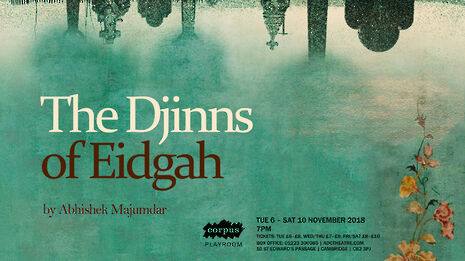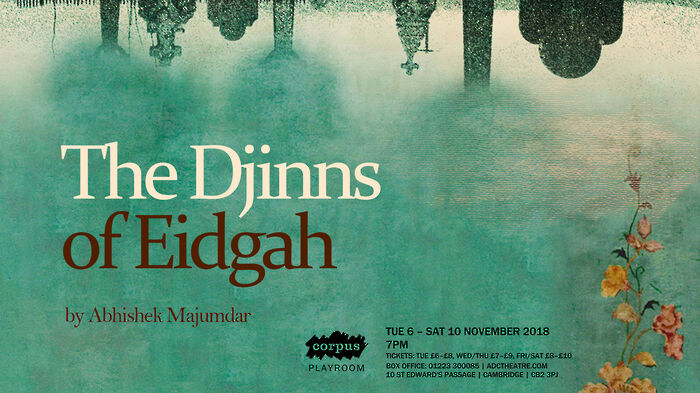The Djinns of Eidgah review
An unforgettable play full of beautiful and haunting performances

The Djinns of Eidgah is a play I will struggle to forget. This is tragic and haunting theatre that is characterised by a richness and captivating quality throughout. Abhishek Majumdar’s truly remarkable script has been realised in a wonderful production that I cannot stop recommending to others.
The play explores multiple plot lines: Khalid and Bilal are pursuing their dream of playing football by practising for the upcoming regional trials; Bilal’s younger sister, Ashrafi, is being treated for the horrific trauma she experienced by Drs Baig and Wanji at their clinic, whilst two occupying soldiers struggle to come to terms with the politics and morality of their mission at the outpost they are stationed. Throughout all of this, the issue of the Kashmiri conflict permeates, or more accurately suffocates. The politics, violence and deadly struggle become mixed up in everyday life with inevitably gruesome and tragic consequences.
"at no point are we allowed to forget that every second of these characters’ lives is lived under a brutal military occupation"
Walking into the Corpus Playroom, audience members are barked at to show their ID by two armed guards, and it’s impossible not to momentarily feel scared. The presence of the two soldiers (Nusrath Tapadar and Linnea Lagerqvist) in every scene, sat in the corners of the stage with their guns, is an example of the clever direction (Ananya Mishra) seen throughout; at no point are we allowed to forget that every second of these characters’ lives is lived under a brutal military occupation.
The set is incongruously colourful, which works. The vivid and bright depictions of signs of protest and resistance are painted onto four tall white sheets, juxtaposed with barbed wire and our omnipresent soldiers at either side. The music played during scene transitions has an eerie quality and fits perfectly.
"Seb’s performance is outstanding in the most understated and controlled way possible"
Without doubt, though, the residing memory I will have of this show is of the superb acting. Eliz Avni’s nuanced performance as young Ashrafi suffering from the terrible effects of an unspeakably traumatic event is beautiful and affecting. Her lines are delivered with childish innocence mixed with a dark tragedy that bubbles under the surface of her infantile tone of voice; the effect produced is chilling and deeply upsetting. The scene in which she applies make up to her brother, Bilal (Anand Joshi), only to enter a fit of horror as he removes it is powerfully unsettling, as is the intonation of Bilal’s shaking voice and the terror we can see in his eyes.
Bilal and Khalid’s (Noor A. Noor) scenes are characterised by a natural chemistry, with Khalid’s charismatic and witty nature never far from being punctuated by a devotion to the struggle for Kashmiri autonomy and freedom, one unmatched by his friend.
But the best scenes are those featuring Dr Baig (Suchitra Seb). Whether counselling Ashrafi, admonishing Dr Wani (Claire Chung, also an accomplished performance) for her political beliefs impinging on her work, or being haunted by the djinn (loosely translated as spirit, or demon) of her dead mujahid son (Imane Bou-Saboun, another fantastic performance which was haunting for all the right reasons), Seb’s performance is outstanding in the most understated and controlled way possible. The counseling session in which she and Ashrafi share their last memories of their deceased loved ones is delivered astonishingly well, and confirmed in my thinking that hers was the best performance I have ever seen by an actor in Cambridge theatre.
Given that all but one of this play’s cast are actors of an ethnic minority background, it does beg the question why Cambridge theatre casts are still overwhelmingly white. This is a loss for the casts, directors and audiences, but most importantly the actors themselves! I hope that this production of The Djinns of Eidgah plays a role in effecting much needed change in this area, as it has been far too long in the coming.
The production isn’t perfect. One guard appears to carry a gun you might see on Fortnite, the other from a World War II film. The opening scene has some clumsy delivery, and the mixture of accents attempted (some are excellent, others conspicuous by their absence) produces a slightly disjointed effect. But this is an outstanding play that will leave no one unaffected. Your attendance is simply required.
 News / CUP announces funding scheme for under-represented academics19 December 2025
News / CUP announces funding scheme for under-represented academics19 December 2025 News / Cambridge welcomes UK rejoining the Erasmus scheme20 December 2025
News / Cambridge welcomes UK rejoining the Erasmus scheme20 December 2025 News / SU reluctantly registers controversial women’s soc18 December 2025
News / SU reluctantly registers controversial women’s soc18 December 2025 Film & TV / Timothée Chalamet and the era-fication of film marketing21 December 2025
Film & TV / Timothée Chalamet and the era-fication of film marketing21 December 2025 News / News in Brief: humanoid chatbots, holiday specials, and harmonious scholarships21 December 2025
News / News in Brief: humanoid chatbots, holiday specials, and harmonious scholarships21 December 2025









